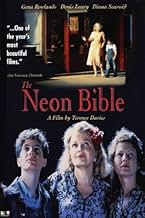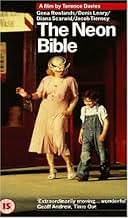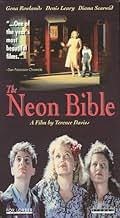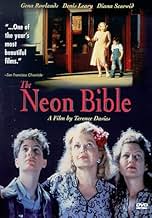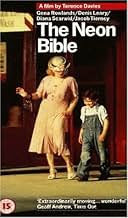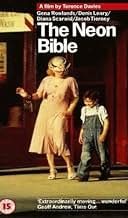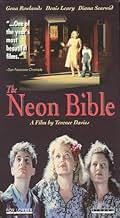While on a train, a teenage boy thinks about his life and the flamboyant aunt whose friendship acted as an emotional shield from his troubled family. This film evokes the haunting quality of... Read allWhile on a train, a teenage boy thinks about his life and the flamboyant aunt whose friendship acted as an emotional shield from his troubled family. This film evokes the haunting quality of memory while creating a heartfelt portrait of a boy's life in a rural 1940s Southern town... Read allWhile on a train, a teenage boy thinks about his life and the flamboyant aunt whose friendship acted as an emotional shield from his troubled family. This film evokes the haunting quality of memory while creating a heartfelt portrait of a boy's life in a rural 1940s Southern town.
- Director
- Writers
- Stars
- Awards
- 1 win & 2 nominations total
- Director
- Writers
- All cast & crew
- Production, box office & more at IMDbPro
Featured reviews
The resulting film is disjointed, episodic and because of how internalized David is the plotting is hard to fully grasp. I am not sure if the plot is understandable if you *haven't* read the book. The material is about the oppressive nature of small town life for different people-especially fire and brimstone religion-builds up anger and resentment that comes out in violence. That comes across in the film if you know you are looking for it. If you not I think much of the film will be esoteric.
I ultimately ended up liking the film on the level of the companion to the novel. It helps a lot that I rather like the book and there's not much different in the works. The cinematic qualities are fairly good-if a little TV production. The melancholy of the novel comes through loud and clear.
Overall I am glad this film exists but it could have been better.
Davies is also, in my opinion, one of the few directors who accurately depicts the act of remembering. Without giving anything away, it's always important to keep in mind that David is on a train, thinking and remembering. No one remembers something from the past totally, memory functions like fragments and it's up to us to flesh them out. Sometimes we think of something one way, later another away; forget, remember or distort. David is fleshing out the events of his life and that's th most important thing about the film. Sometimes we remember minute, isolated events... Davies puts those in the film as well. Just sit back and enjoy the pace of this remarkable film from an equally remarkable and brilliant director.
A sheet blowing - music from Gone With the Wind - he turns into high drama; Stephen Foster's 'Hard Times' as David begins to hit bottom. It IS a musical - Davies has always used music for forward his narrative and uses it in this film in a more sophisticated way than in his earlier films to even more startling effect.
Everyone turns in remarkable performances - the entire cast and the photography is beyond amazing. Davies is the master of the tracking shot.
Please, be patient with the pace of the film - sit back and enjoy the ride. Get used to the rhythms and then give all of yourself to the film, jump in. It's beautiful, melancholy and sad. Davies' films are always so full of life and this is no exception. No idea why this film gets a bad rap - hands down, one of the greatest films of the 1990s. It's totally unique - it comes from nowhere. Shots, colors, textures - all perfect. Everything. Enjoy the ride.
Edward Guthmann said the film was poorly received when it premiered at Cannes, but called it "gorgeous" and "one of the year's most beautiful films." He said it was a rewarding film that requires a little faith from the viewer due to long, slow, "lingering shots that work as a kind of meditation." He described the revival meeting at night "like an Edward Hopper or Thomas Hart Benton painting come to life." I will grant the film that it looks beautiful, but it lacks a deeper substance which would be necessary to make this a great film.
Director Terence Davies said "The Neon Bible doesn't work, and that's entirely my fault. The only thing I can say is that it's a transition work. And I couldn't have done The House of Mirth without it." I appreciate that he is humble enough to admit this is not his best work. Again, the film looks brilliant, so it's far from a complete failure. And you have to respect the brave casting decision that brought Denis Leary, not known for his subtle acting, on board.
The problem lies entirely at the feet of director Terence Davies . He directs in a poetic style or at least attempts to but where as a poetic film by Terewnce Malik or Sam Mendes works here it spectacular fails . . What sinks the film is the unnatural framing where a character is smack bang in the middle of the screen facing the camera . A lot of critics complain that a director like Danny Boyle shoots , frames and edits films in a similar manner but at least he brings a sense of variety to his movies . Here however Davies relies on the exact same framing technique throughout the entire film which sinks it as a cinematic presentation and feels more like a filmed theater play
Did you know
- TriviaIn an interview with "Time Out Film", Terence Davies said about this film, "[It] doesn't work, and that's entirely my fault. The only thing I can say is that it's a transition work. And I couldn't have done Chez les heureux du monde (2000) without it."
- Quotes
David, aged 15: If you were different from anybody else in town, you had to get out. They used to say in school, "you have to think for yourself," but you couldn't do that in town. You have to think what your father thought and that was what everybody thought.
- ConnectionsFeatured in Fandor: Cannes You Dig It? | Fandor Spotlight (2022)
- SoundtracksOh Lord, How Long?
Traditional
- How long is The Neon Bible?Powered by Alexa
Details
Box office
- Gross US & Canada
- $78,072
- Opening weekend US & Canada
- $5,045
- Mar 3, 1996
- Gross worldwide
- $78,072
- Runtime
- 1h 31m(91 min)
- Color
- Sound mix
- Aspect ratio
- 2.35 : 1

